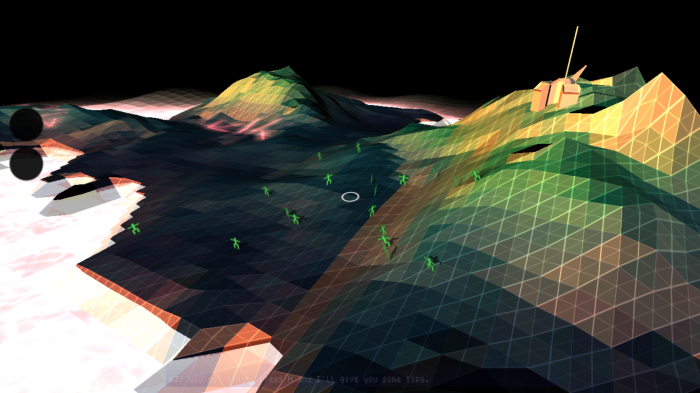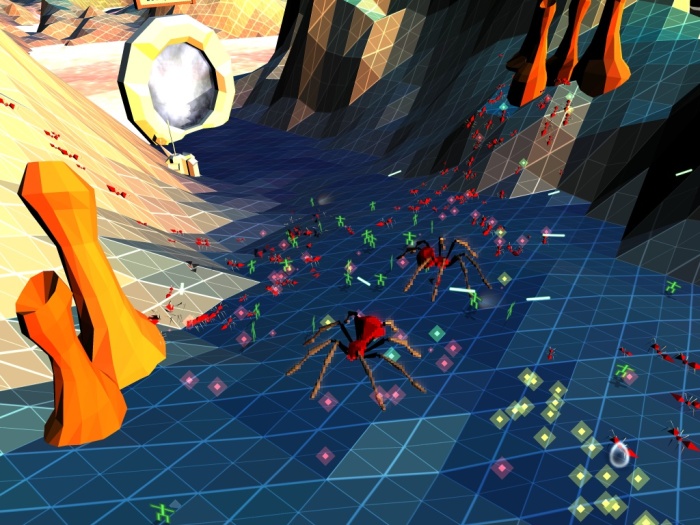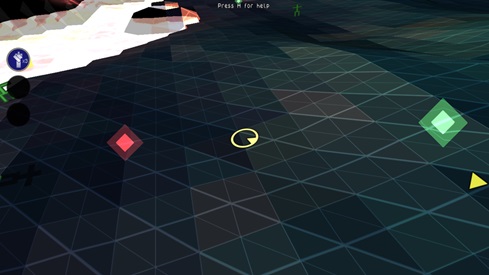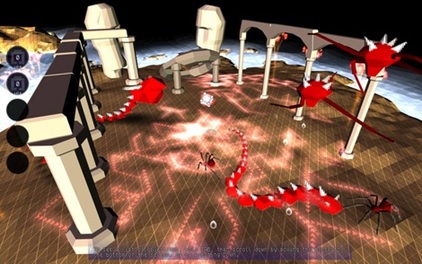Darwinia and Simulation
A World Virtually Akin to Ours
Brandon Packard
Darwinia holds its own as a cult classic video game. In this game, Dr. Sepulveda has created a purely digital universe known as Darwinia. The inhabitants, the Darwinians, are self-learning pieces of code. However, they have been bred and enhanced over so many generations that they are now considered to be not just pieces of code, but sentient beings! One day, a virus attacks Darwinia, and wipes out many of the Darwinians. Since they are considered to be as alive as you or I, the player’s task is to enter Darwinia and save them from the virus. The game has unique visuals and decent gameplay, but what really drew me into it is its absolute treasure trove of philosophical implications, and some surprising parallels that can be drawn from it.

Figure 1: One of the last remaining groups of Darwinians, with viruses lurking in the background.
Let’s start with the big revelation made at the end of the game. It turns out that the Darwinians themselves are inadvertently responsible for the virus, and therefore for their own near destruction! Dr. Sepulveda once let the Darwinians see his face when working on Darwinia, and they assumed him to be their creator and God. They even began to build a temple to him, eager to get some sort of communication from their savior. Too eager, in fact. Since they are computer programs, they began to essentially data-mine the computer system for files, looking for messages from him. In the process, they found his e-mail program and started downloading e-mails, believing them to be messages from God. In their excitement and haste, they also pulled down three spam e-mails which happened to be heavily infected with viruses. Just as the environment allows Darwinians to evolve and grow, it also allowed the virus to corrupt Darwinians into terrifying creatures, until it had almost completely wiped out their civilization.
Although humans have never really mutated in this sense, there is a strong correlation between Darwinia and our world. Religion is not inherently bad (I am somewhat religious myself). Sometimes, though, people get so caught up in religion, trying to communicate with and please their God, that they wreak havoc on others and themselves as a result. There have been many instances of crimes such as murder where the culprit truly believes that their God was the one telling them to commit those atrocities (even if those crimes do not align with what religion says that God would want). Indeed, there are many more instances where humans hate each other due to supposed words from their God(s). This demonstrates a stark parallel between the Darwinians and humans.
Figure 2: A Darwinian Soul (Right) and a Corrupted Darwinian Soul (Left)
The second interesting aspect of Darwinia is its concept of death. Originally, Darwinians could not truly die. Every Darwinian has a soul, but when they are destroyed, that soul is sent to a central repository of sorts, where it is then used along with a blueprint to be reborn as a new Darwinian. In that way, Darwinians can never really “die.” Or at least, they couldn’t ever die, until the virus came. All of the virus manifestations are able to corrupt souls into their current form, but some are able to outright destroy them—a feat that according to the in-game lore, Dr. Sepulveda never thought would be possible. Since we know that the Darwinians caused the virus, this means that they are the ones who brought death to their civilization! This (like other aspects of the game) has strong ties to Adam and Eve and how they brought death upon the human race. However, it can also be applied other forms of human self-destruction. Consider that humanity could wipe itself out with nuclear war or catastrophic climate change.
Figure 3: An infected e-mail (The cube) surrounded by a wide variety of viruses. (1)
Perhaps the most philosophically troubling aspect of the game is that the Darwinians are living in a computer simulation—just as we humans might be! The Darwinians hadn’t even considered that they could be in a simulation until they managed to download files of Darwinia’s blueprints from Dr. Sepulveda’s computers. Previously, they believed they were truly alive sentient beings, with free choice, wills, souls, and so on. The news that they are simply sentient pieces of computer code in a simulation comes as a complete shock to them all, and it’s information they really don’t know how to handle.
So how do we know we aren’t living in a computer simulation? It seems ridiculous to us, but then again it seemed ridiculous to the Darwinians as well! If we believe that we could one day create sentient artificial life through advanced technology, then how can we discredit the idea that some race with much more sophisticated technology than us could create us? In 47 years, we have gone from Pong, a simple game with 2 rectangles and a dot, to a photorealistic 3-dimensional game where millions can play at the same time. In fact, we even have virtual reality where you can, to an extent, place yourself into the game! Assuming video games and computers continue to evolve and improve, eventually we may create video games nearly identical to the real world. If we can eventually do that, then who is to say that someone hasn’t already done it, and we are merely the result? Furthermore, although this doesn’t mean that we are living in a simulation, I would argue that it is impossible to prove that we are not living in a simulation. Any evidence we have that we are not living in a simulation could simply be itself simulated!
In conclusion, Darwinia is a great game not because of the gameplay itself, but because of the many implications of the digital world of Darwinia. The Darwinians resemble the early stages of humanity itself. As such, we can draw frightening parallels between our world and this tale of digital, sentient beings in a computer simulation to our past.
References: [1]: Screenshot credit to https://darwinia.standardof.net/darwinia/level-walkthrough-guides/temple/F
For More on the simulation hypothesis see William Irwin’s discussion with Keith Olbermann.
Dr. Brandon Packard is an assistant professor at Clarion University. His research interests are video games, AI, and machine learning, and the ethical questions thereof. In his spare time, he enjoys playing video games and working on programming projects, and has played through Darwinia many times.







Be sure to check out our fellow WordPress blog, its a beer blog, but it gets pretty darn philosophical at times!
http://thebeerthrillers.home.blog/